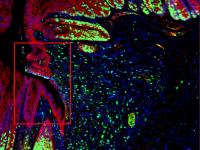
This is a cross section of an injury in the large intestine with the intestinal epithelium shown in red. Over 3.5 million people in Europe and the US suffer from Crohn's disease or ulcerative colitis – the two most common forms of IBD. Chronic bowel inflammation is caused by an overreaction of the immune system to the bacteria which naturally occur in the gut. "This overreaction can come about if, for example, the anti-stress mechanism in the cells of the intestinal mucosa does not function correctly," explains Prof. Dirk Haller of the TUM Chair of Nutrition and Immunology.
What Prof. Haller is referring to is the unfolded protein response (UPR) – a sequential chain of signals in the cell, the role of which is to protect the cells against stress. "The UPR is a kind of cell repair mechanism that kicks in when proteins are not properly folded when they are produced – a major cause of cell stress," Haller continues. Any disturbance of the signaling cascade can lead to inflammation and cell death. This damages the cells of the intestinal mucosa, a pre-condition for the development of IBD.
The C/EBP homologous protein (CHOP) plays a major role in activating the UPR. It seems, however, that the CHOP is also involved in the inflammatory process. The research team decided to take a closer look at the CHOP protein. Using a new mouse model, the scientists examined the role of the protein in the development of chronic bowel inflammation. They modified the DNA so that the intestinal epithelial cells of the mice produced larger amounts of the protein.
Damaged cells recover at a slower rate
The higher CHOP protein count made the mice more susceptible to intestinal inflammation. In addition, the inflammation was slower to abate and the intestinal mucosa subsequently required more time to regenerate. "But contrary to what was previously assumed, the higher CHOP concentration is not actually what causes the epithelial cells to die," Haller explains. "Rather, the CHOP proteins inhibit cell division, thus slowing the regeneration of the mucosa following injury."
Such injuries, which can be caused by an infection, are often the first step to chronic inflammation of the bowel. The researchers' findings provide further confirmation that a properly functioning UPR signaling cascade is an essential condition for healthy intestinal mucosa. Regulatory disturbance can seriously impair the protective function of the intestinal epithelium and play a role in the development of chronic intestinal inflammation.
Source : ![]() Share
Share
 Print Article
Print Article Mail to a Friend
Mail to a Friend
